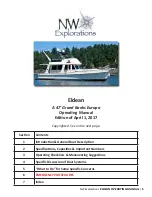
79
Water and sewage water
8
U
SE
OF
MARINE
WC
S
F ITTE D
WITH
BLACK
WATE R
TANK
Open the water intake valve (valve handle parallel to the pipe).
In the case of a direct discharge into the sea: Open the draining valve.
In case you store the waste waters in the tank: Make sure the draining valve is closed (valve handle perpendicular to the pipe).
To drain the bowl, set the control lever of the pump slantwise (FLUSH) then operate the pump.
To dry the bowl, set the lever vertical (DRY) then operate the pump.
In order to avoid clogging the heads:
- Only use absorbent paper inreasonable quantities.
- Schedule a regular rinsing through of the system with fresh water.
- Always retain a little water in the bottom of the bowl to avoid smells
To empty the tank:
- In an authorized area, open the draining valve.
- In a marina equipped with a system to suck the waste waters, put the sucking hose into the tank through the deck filler.
Start the pump of the sucking system. The filler caps are opened and closed with an appropriate key. When the tank is
empty, check the cap seal for condition then close the filler.
- Capacity of sewage tank: 80 litres.
Sewage tank
Lay out of: Cockpit locker
Drainage to sea
Drainage through suction outlet -
Starboard catwalk
W
ARNING
-Tanks nominal load capacity cannot be fully
used based due to trim and boat loading. A 20%
reserve should be kept..
W
ARNING
-Ask for information about the laws in force in
your country or your marina about discharging
your waste waters into the sea.
P
RE CAUTION
-Close the valves after each use and above all
when the boat is unattended.
P
RE CAUTION
-Regular check the tank level. High pressure due
to too high a level may cause leaks or more
unpleasant troubles.
Summary of Contents for FIRST 35
Page 1: ...FIRST 35 Code 091962 Owner s Manual ...
Page 2: ......
Page 4: ......
Page 7: ...3 Introduction HISTORY OF UPDATES Index A 08 2009 ...
Page 8: ......
Page 10: ......
Page 11: ...7 General specifications Technical specifications Certification Design category Your boat 1 ...
Page 26: ...22 Safety Use of the manual bilge pump Lay out of Operation ...
Page 28: ...24 Safety Acces to sector ...
Page 30: ......
Page 31: ...27 Hull Maintenance of the Hull Carreening 3 ...
Page 32: ...28 Hull Carreening Wetted area 27 5 m ...
Page 34: ......
Page 42: ......
Page 44: ......
Page 45: ...41 Steering system Steering Gear 5 ...
Page 46: ...42 Steering system Steering Gear ...
Page 47: ...Steering system 5 43 Detail B Detail C Detail D ...
Page 51: ...47 Rigging and Sails Standing rigging Running rigging Winches Sail setting Sails 6 ...
Page 52: ...48 Rigging and Sails Rigging Cruising DWL 1 2 3 4 5 ...
Page 54: ...50 Rigging and Sails Rigging Racing carbon DWL DWL 1 2 3 DWL 4 5 ...
Page 67: ...63 Fittings Introduction Interior maintenance Maintenance of fabrics 7 ...
Page 68: ...64 Fittings INTRODUCTION Fittings ...
Page 72: ......
Page 73: ...69 Water and sewage water Water tank Water system Distribution Water system Drainage Sewage 8 ...
Page 78: ......
Page 84: ......
Page 85: ...81 Electrical equipment General information 12 V DC system 110 220 VAC system Equipment 9 ...
Page 86: ...82 Electrical equipment Schematic diagram 12V T 30 ma 40A 220 Volts 50Hz ...
Page 98: ...94 Electrical equipment Electronics Transducer location View interior View Outside ...
Page 100: ......
Page 101: ...97 Engine General information Engine fitting 10 10 ...
Page 102: ...98 Engine Fuel tank Fuel filler Gauge Electrical panel Refer to the instructions for use ...
Page 104: ...100 Engine ENGINE FITTING ...
Page 105: ...101 Engine 10 10 ...
Page 106: ...102 Engine ...
Page 115: ...111 Launching Launching recommendations Stepping the mast 11 11 ...
Page 116: ...112 Launching POSITION OF HOISTING CRADLE AND STRAPS ...
Page 119: ...115 Winter Storage Laying up Protection and maintenance 12 12 ...
Page 120: ......
Page 122: ......
















































